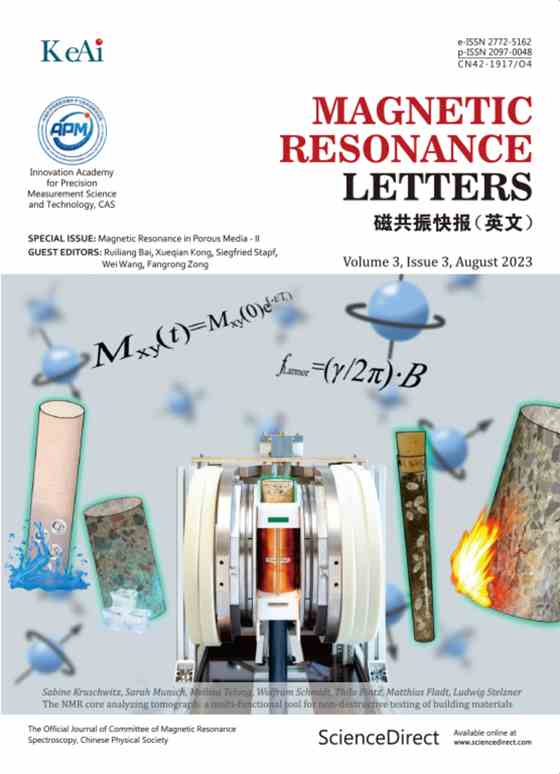Volume 3 Issue 3 The NMR core analyzing tomograph: a multifunctional tool for non-destructive testing of building materials
Published 05 September, 2023

NMR is becoming increasingly popular for the investigation of building materials as it is a non-invasive technology that does not require any sample preparation nor causes damage to the material. Depending on the specific application it can offer insights into properties like porosity and spatial saturation degree as well as pore structure. Moreover it enables the determination of moisture transport properties and the (re-)distribution of internal moisture into different reservoirs or chemical phases upon damage and curing. However, as yet most investigations were carried out using devices originally either designed for geophysical applications or the analysis of rather homogeneous small scale (< 10 mL) samples. This paper describes the capabilities of an NMR tomograph, which has been specifically optimized for the investigation of larger, heterogeneous building material samples (diameters of up to 72 mm, length of up to 700 mm) with a high flexibility due to interchangeable coils allowing for a high SNR and short echo times (50–80 μs).

Sabine Kruschwitz
Sabine Kruschwitz obtained a Master's degree in Geophysics from the Technical University of Berlin (TUB) in 2002, and has since worked on numerous national and international research projects at the Bundesanstalt für Materialforschung und -prüfung (BAM). She completed her PhD at TUB in 2007 and has gained additional expertise during both of her one year stays at NIST and the Rutgers University, USA. In 2016, Sabine was appointed as Junior Professor, heading the “Nondestructive Building Material Testing” division at TUB. Concurrently, she leads a junior research group at BAM with a focus on “Material Characterization and Informatics for the Sustainability in Civil Engineering”.

Sarah Munsch
Sarah Munsch obtained her Master's degree in Geotechnology at the Technische Universität Berlin in 2017. Since then she works as a scientific assistant at Bundesanstalt für Materialforschung und -prüfung. Her work is mainly focused on the conduction and evaluation of NMR measurements on various porous building materials with respect on moisture ingression profiles, porosity determination, and pore space characterization. A doctoral thesis about the interpretation of NMR signals in partly saturated sandstones is in progress. E-mail: sarah.munsch@bam.de

Melissa Telong
Melissa Telong obtained her Master's degree in Civil Engineering at the Technische Universität Berlin in 2022. Subsequently she started working as a scientific assistant at Bundesanstalt für Materialforschung und -prüfung, where she mainly uses NMR to characterize the hydration behavior of fresh mortar and concrete samples and the pore space characteristics of hardened samples. She is also investigating ways to predict, e.g. carbonation behavior based on NMR results using AI methods. E-mail: melissa.telong@bam.de

Wolfram Schmidt
Wolfram Schmidt works at in the department “Safety of Structures” at BAM, responsible for the rheology and admixtures laboratory with a research focus on innovative cement and concrete constituents. Furthermore, he is secretary of the German Rheological Society, founder of the Pan-African cement round robin (PACE-PTS) and initiator of the conference series “Advances in Cement and Concrete Technology in Africa” (ACCTA) and ISEE-Africa (Innovation, Science, Engineering, Education). He received the German-African Innovation Incentive Award and is member of RILEM and fib and among others convenor for sub-Saharan Africa and officer in the RILEM Development Advisory Committee.

Thilo Bintz
Thilo Bintz studied Geology at Freie Universität Berlin and earned a Master's degree in Geophysics. He has worked as a research assistant at the Technische Universität Berlin and the Bundesanstalt für Materialforschung und -prüfung, where he is currently pursuing a PhD focusing on the transport of moisture and deleterious ions in building materials. For his studies Thilo uses NMR and LIBS investigating transport processes of mostly alternative and more environmentally friendly types of cementitous binders. E-mail: thilo.bintz@bam.de

Matthias Fladt
Matthias Fladt completed his Master's degree in Geosciences at Heidelberg University in 2017. After a five-month internship at Heidelberg Materials he joined the Bundesanstalt für Materialforschung und -prüfung as a research assistant in 2018. His research focus is on evaluating the effectiveness of internal hydrophobic treatment of road pavement concrete in preventing alkali-silica reaction. Additionally, he is studying the impact of hydrophobic treatment on moisture ingress, particularly after a freeze-thaw cyclic exposure. E-mail: matthias.fladt@bam.de

Ludwig Stelzner
Ludwig Stelzner received his doctoral degree in civil engineering from Institute of Construction Materials, University of Stuttgart in Germany in 2021. He is currently working as a postdoc at the department of Fire Engineering at the Bundesanstalt für Materialforschung und -prüfung in Berlin. His research field is material and structural behavior of concrete during fire exposure. E-mail: ludwig.stelzner@bam.de